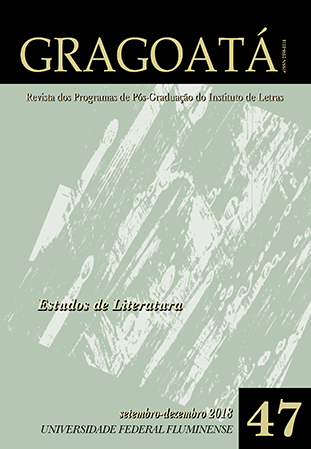Função paterna: a monstruosidade do pai em 'Hora de dormir', de Santiago Villela Marques, e 'A Terceira margem do rio', de Guimarães Rosa
##plugins.pubIds.doi.readerDisplayName##:
https://doi.org/10.22409/gragoata.v23i47.33610Mots-clés:
monstruosidade, violência, patriarcalismo, civilização.Résumé
A função do “pai”, na família patriarcal, seria representar a lei fundamental: interditos considerados necessários para a própria constituição do sujeito e da civilização. Tendo em vista as representações dessa “função paterna” nas narrativas dos contos Hora de dormir, de Santiago Villela Marques, e A terceira margem do rio, de João Guimarães Rosa, pretende-se analisa-la comparativamente. Interessante perceber, em um primeiro momento, que ambos os escritores apresentam marcas de regionalismo em suas obras capazes de colocar em xeque o projeto moderno de civilização brasileira. Mesmo que Rosa seja canônico por excelência, e Marques esteja ainda passando por um processo de reconhecimento pela crítica, a análise comparativa entre os dois textos pode ser considerada pertinente e enriquecedora para os estudos literários. Nesse sentido, faz-se pertinente perceber que a “monstruosidade” do pai, no conto de Rosa, estaria intimamente vinculada ao silêncio, ao abandono da cultura e de sua lógica binária, incapaz de dar sentido existencial satisfatório aos membros dessa família de cunho patriarcal. Essa “monstruosidade” remeteria a família a um inaceitável momento aquém da cultura, ou seja, animalesco, já que o patriarca se apresentaria muito mais próximo do estado de natureza. No conto de Marques, a “monstruosidade” do pai residiria muito mais no fato de fazer uso indiscriminado e irascível da violência física, não para promover um dito bem-estar ou bom funcionamento da instituição familiar de acordo com preceitos pré-determinados, mas sim para assinalar sua dita posição hierárquica diante da condição objetal da mãe e do filho Danilo. Nesse sentido, a figura do pai é apresentada como alguém que, apesar de representar socialmente a regra, a lei e a ordem estruturantes da família patriarcal, promoveria o contrário, ou seja, a sua desestruturação e instabilidade. Na narrativa de Rosa, essa cultura também é problematizada, mas de uma maneira mais enigmática e silenciosa. Se, no conto de Marques, a “civilização” estaria irreversivelmente deformada em razão do caráter violento do pai, no texto roseano as instituições sociais falhariam na tentativa de decodificar, classificar e controlar o ato do patriarca, ficando, também, irreversivelmente questionadas e esvaziadas de sentido. Dessa forma, percebe-se que, em ambos os textos, a civilização de cunho patriarcal se encontra falida em sua capacidade de significar o mundo e gerenciar as relações sociais de modo satisfatório.
---
##plugins.generic.usageStats.downloads##
##submission.downloads##
Publiée
Comment citer
Numéro
Rubrique
Licence
AUTORIZAÇÃO
Autores que publicam em Gragoatá concordam com os seguintes termos:
Os autores mantêm os direitos e cedem à revista o direito à primeira publicação, simultaneamente submetido a uma licença Creative Commons Atribuição 4.0 Internacional (CC BY 4.0), que permite o compartilhamento por terceiros com a devida menção ao autor e à primeira publicação pela Gragoatá.
Os autores podem entrar em acordos contratuais adicionais e separados para a distribuição não exclusiva da versão publicada da obra (por exemplo, postá-la em um repositório institucional ou publicá-la em um livro), com o reconhecimento de sua publicação inicial na Gragoatá.
A Gragoatá utiliza uma Licença Creative Commons - Atribuição CC BY 4.0 Internacional.














